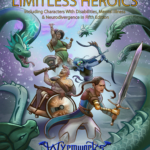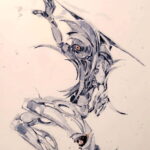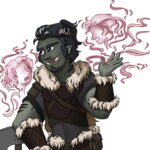Phobia

You have a persistent, excessive fear of an object, person, animal, activity or situation. Choose or roll on the following table, or choose a different stimulus. When within (IE) × 10 feet of the phobic stimulus, you must succeed on a DC 8 + (IE) Wisdom saving throw each round. On failure, you must move away from the stimulus or have a −(IE) penalty on all Intelligence, Wisdom, and Charisma ability checks due to distraction, and you must succeed on a DC 8 + (IE) Constitution saving throw to maintain concentration on an applicable spell each round. This trait always has a Triggered Frequency, and you may choose or roll more than one Phobia.
Note that the labels can be broad, so when you roll or choose a Phobia, discuss with your GM what exactly it encompasses and what may have caused it. A fear of rats may relate more to their size than their shape. It also doesn’t give you additional awareness and is based on your perceptions, so if you’re afraid of spiders, a fiend that looks like one would probably also be included, or a fear of a gender would be based on your perception of gender, not the object’s own gender experience.
document.getElementById("generate-phobia").addEventListener("click", function() { var phobias = [ "Biomophobia: a specific biome", "Topophobia: a specific location or places like it", "Numerophobia: a specific number", "Ektropophobia: aberrations", "Batrachophobia: amphibians and frog-like creatures", "Thymomenophobia: angry people", "Kallitechnophobia: aristocrats and royalty", "Panoplophobia: armor", "Anthropozoophobia: beast-like humanoids", "Zoophobia: beasts", "Autophobia: being alone", "Catagelophobia: being ridiculed", "Scoptophobia: being stared at", "Aphenphosmphobia: being touched", "Ornithophobia: birds", "Hemophobia: blood", "Bibliophobia: books and scrolls", "Toxophobia: bows and other stringed weapons", "Gephyrophobia: bridges", "Zootryponophobia: burrowing creatures", "Koumpounophobia: buttons", "Wiccaphobia: casters", "Ailurophobia: cats", "Angelophobia: celestials", "Pedophobia: children", "Politophobia: cities", "Ierotikophobia: clerics and clergy", "Kibotophobia: closed containers", "Coulrophobia: clowns", "Trypophobia: clusters of small holes", "Claustrophobia: confined spaces", "Kataskeniphobia: constructs", "Chromozoophobia: creatures of a certain color", "Cornophobia: creatures with horns or antlers", "Pterophobia: creatures with quills and spikes", "Plokamophobia: creatures with tentacles", "Pterugophobia: creatures with wings", "Achluophobia: darkness", "Necrophobia: death or dead things", "Dinosaurophobia: dinosaurs", "Cynophobia: dogs", "Draconophobia: dragons", "Pogonophobia: dwarves", "Stoicheiodiphobia: elementals", "Xotikophobia: elves", "Basophobia: falling", "Neraidophobia: fey creatures", "Daemonophobia: fiends", "Pyrophobia: fire", "Anthophobia: flowers", "Pteromerhanophobia: flying", "Megalophobia: giants", "Nanophobia: gnomes", "Misophobia: halflings", "Acrophobia: heights", "Domatophobia: houses", "Automatonophobia: human-like figures", "Entomophobia: insects", "Astynomiophobia: law enforcement officers", "Technourgimophobia: magic items", "Stratiotophobia: martial classes", "Androphobia: men", "Catoptrophobia: mirrors", "Pithikophobia: monkeys and ape-like creatures", "Teratourgimophobia: monstrosities", "Aichmophobia: needles or pointed objects", "Trypanophobia: needles/injections", "Arithmophobia: numbers", "Chromophobia: one or more colors", "Kalikantzarophobia: one or more monstrous humanoid races such as orcs or goblinoids", "Laspophobia: oozes", "Agoraphobia: open spaces or crowds", "Algophobia: pain", "Anthropophobia: people or society", "Botanophobia: plants", "Herpetophobia: reptiles", "Amaxophobia: riding in a cart or carriage", "Pontikiphobia: rodents", "Katergarophobia: rogues", "Metamorphophobia: shapeshifters", "Microphobia: small animals", "Ophidiophobia: snakes", "Chionophobia: snow and ice", "Glossophobia: speaking in public", "Arachnophobia: spiders", "Bathmophobia: stairs or steep slopes", "Xenophobia: strangers or foreigners", "Sminophobia: swarms", "Noctiphobia: the night", "Tonitrophobia: thunder", "Astraphobia: thunder and lightning", "Chronophobia: time (deadlines and schedules)", "Lilapsophobia: tornadoes and hurricanes", "Haphephobia: touch", "Dendrophobia: trees", "Cacophobia: ugliness", "Apethanatophobia: undead", "Hydrophobia: water", "Aerophobia: wind", "Gynophobia: women" ]; var randomNumber = Math.floor(Math.random() * 100) + 1; var result = phobias[randomNumber - 1]; document.getElementById("result").innerHTML = result; });
| d100 | Phobia | Stimulus |
|---|---|---|
| 1 | Biomophobia | a specific biome |
| 2 | Topophobia | a specific location or places like it |
| 3 | Numerophobia | a specific number |
| 4 | Ektropophobia | aberrations |
| 5 | Batrachophobia | amphibians and frog-like creatures |
| 6 | Thymomenophobia | angry people |
| 7 | Kallitechnophobia | aristocrats and royalty |
| 8 | Panoplophobia | armor |
| 9 | Anthropozoophobia | beast-like humanoids |
| 10 | Zoophobia | beasts |
| 11 | Autophobia | being alone |
| 12 | Catagelophobia | being ridiculed |
| 13 | Scoptophobia | being stared at |
| 14 | Aphenphosmphobia | being touched |
| 15 | Ornithophobia | birds |
| 16 | Hemophobia | blood |
| 17 | Bibliophobia | books and scrolls |
| 18 | Toxophobia | bows and other stringed weapons |
| 19 | Gephyrophobia | bridges |
| 20 | Zootrypono | burrowing creatures |
| 21 | Koumpounophobia | buttons |
| 22 | Wiccaphobia | casters |
| 23 | Ailurophobia | cats |
| 24 | Angelophobia | celestials |
| 25 | Pedophobia | children |
| 26 | Politophobia | cities |
| 27 | Ierotikophobia | clerics and clergy |
| 28 | Kibotophobia | closed containers |
| 29 | Coulrophobia | clowns |
| 30 | Trypophobia | clusters of small holes |
| 31 | Claustrophobia | confined spaces |
| 32 | Kataskeniphobia | constructs |
| 33 | Chromozoophobia | creatures of a certain color |
| 34 | Cornophobia | creatures with horns or antlers |
| 35 | Pterophobia | creatures with quills and spikes |
| 36 | Plokamophobia | creatures with tentacles |
| 37 | Pterugophobia | creatures with wings |
| 38 | Achluophobia | darkness |
| 39 | Necrophobia | death or dead things |
| 40 | Dinosaurophobia | dinosaurs |
| 41 | Cynophobia | dogs |
| 42 | Draconophobia | dragons |
| 43 | Pogonophobia | dwarves |
| 44 | Stoicheiodiphobia | elementals |
| 45 | Xotikophobia | elves |
| 46 | Basophobia | falling |
| 47 | Neraidophobia | fey creatures |
| 48 | Daemonophobia | fiends |
| 49 | Pyrophobia | fire |
| 50 | Anthophobia | flowers |
| 51 | Pteromerhanophobia | flying |
| 52 | Megalophobia | giants |
| 53 | Nanophobia | gnomes |
| 54 | Misophobia | halflings |
| 55 | Acrophobia | heights |
| 56 | Domatophobia | houses |
| 57 | Automatonophobia | human-like figures |
| 58 | Entomophobia | insects |
| 59 | Astynomiophobia | law enforcement officers |
| 60 | Technourgimophobia | magic items |
| 61 | Stratiotophobia | martial classes |
| 62 | Androphobia | men |
| 63 | Catoptrophobia | mirrors |
| 64 | Pithikophobia | monkeys and ape-like creatures |
| 65 | Teratourgimophobia | monstrosities |
| 66 | Aichmophobia | needles or pointed objects |
| 67 | Trypanophobia | needles/injections |
| 68 | Arithmophobia | numbers |
| 69 | Chromophobia | one or more colors |
| 70 | Kalikantzarophobia | one or more monstrous humanoid races such as orcs or goblinoids |
| 71 | Laspophobia | oozes |
| 72 | Agoraphobia | open spaces or crowds |
| 73 | Algophobia | pain |
| 74 | Anthropophobia | people or society |
| 75 | Botanophobia | plants |
| 76 | Herpetophobia | reptiles |
| 77 | Amaxophobia | riding in a cart or carriage |
| 78 | Pontikiphobia | rodents |
| 79 | Katergarophobia | rogues |
| 80 | Metamorphophobia | shapeshifters |
| 81 | Microphobia | small animals |
| 82 | Ophidiophobia | snakes |
| 83 | Chionophobia | snow and ice |
| 84 | Glossophobia | speaking in public |
| 85 | Arachnophobia | spiders |
| 86 | Bathmophobia | stairs or steep slopes |
| 87 | Xenophobia | strangers or foreigners |
| 88 | Sminophobia | swarms |
| 89 | Noctiphobia | the night |
| 90 | Tonitrophobia | thunder |
| 91 | Astraphobia | thunder and lightning |
| 92 | Chronophobia | time (deadlines and schedules) |
| 93 | Lilapsophobia | tornadoes and hurricanes |
| 94 | Haphephobia | touch |
| 95 | Dendrophobia | trees |
| 96 | Cacophobia | ugliness |
| 97 | Apethanatophobia | undead |
| 98 | Hydrophobia | water |
| 99 | Aerophobia | wind |
| 100 | Gynophobia | women |
Real-world Examples
Phobias, Obsessive-Compulsive Disorder
Assistive Options
With professional assistance, gradual increased exposure and proximity to the phobic stimulus can help reduce the phobic reaction over time. The assisting cleric, druid, or physician must succeed on a DC 8 + (IE) Wisdom (Medicine) check to offer proper assistance. If the assistant fails this check or it’s made without an assistant, you make your Wisdom saving throws with disadvantage. You (the character) will not know that the assistance succeeded, but if they fail, you may notice over time that it’s not helping and seek a different assistant.
When attempting to reduce your phobic reaction, begin with a representation such as a painting or imagining the stimulus and work up from there to maximum exposure with the real version. The player and GM should develop a strategy of eight to ten steps and may attempt this once per day. For the first step, you must succeed on a DC 8 + (IE) Wisdom saving throw for three consecutive attempts. The days need not be consecutive. Once accomplishing that step, the DC increases by 1 and requires three consecutive successful attempts, repeating the process until every step is successfully completed. If you have a traumatic or dangerous experience related to the stimulus, you must succeed on an additional Wisdom saving throw equal to your current step roll or lose one step, even if you’ve completed all steps.
Magical Assistance
The Heroism spell will negate Phobias in the target creature for the duration.

